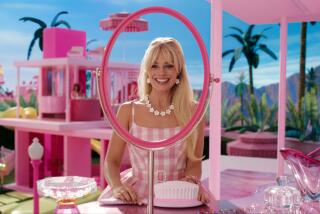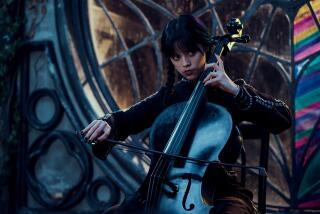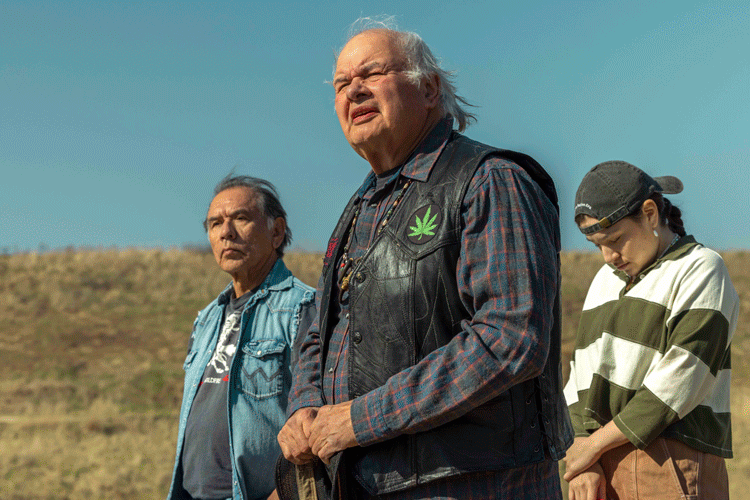‘Wonder Years’ Gets By With Timeless Insights
- Share via
“Some people pass through your life and you never think about them again. . . ,” the unseen narrator observed in a recent episode of ABC’s “The Wonder Years.”
Some television series, too.
Not this one, however. Created by Neal Marlens and Carol Black, “The Wonder Years” is a comedy you can’t help thinking about again . . . and again . . . and again. It’s a memory you carry for days afterward, a half hour you repeatedly replay in your mind and discuss with friends who love the show as much as you do.
That alone makes it special.
“The Wonder Years” (which airs at 8:30 p.m. Tuesdays) is itself a memory--a man in his early 30s (the narrator) recalling his entree to adolescence in the late ‘60s. Although the era is beautifully recalled with music of the time, it’s less a period piece than a kid’s-eye view of growing up in middle-class suburbia, no matter the year.
The youthful attitudes, perceptions and values expressed here are universal and timeless, for at its essence, “The Wonder Years” is a simple story about a kid, his friends and his family.
The center of this “kiddom” (to use the narrator’s word) is Kevin Arnold (Fred Savage), who was 12 when the series began in the spring of 1988, but about a month ago hit 13. He shares a pleasant but undistinctive house with his parents, Jack and Norma (Dan Lauria and Alley Mills), his flower-child older sister, Karen (Olivia d’Abo), and his Godzilla of an older brother, Wayne (Jason Hervey), who exists only to torment Kevin.
There are excellent reasons why “The Wonder Years” won an Emmy after its initial six-episode outing last season and has been a huge hit in the ratings since its return last November:
--It has a swell cast, led by Savage, who plays Kevin to wide-eyed perfection and is so cute you want to reach through the screen and hug him. (But what will happen when his voice changes and he sheds his baby fat and shoots up to 5-foot-10?)
--It’s so good you want to cry. That is to say, besides being very, very funny, it evokes a spate of emotions while tapping the youth in us all.
That was especially the case in an exquisite early episode written by Black and Marlens that had Kevin mystified about his dad’s job and accompanying him to the office to learn what he did as manager of “distribution and product support services at Norcom.”
Kevin swiveled in his dad’s desk chair and proudly watched his dad punch phone buttons, bark out instructions, chew out subordinates and be in command. His dad was a powerful man, a great man.
But Kevin’s perspective abruptly changed when he saw his dad chewed out by his boss. It was one of those small but significant shifts in a relationship, where one party now saw the other with more clarity, where a son now understood why his unfulfilled father disliked his job and escaped each night by star-gazing through a back-yard telescope.
--It’s the only series about kids that seems to have been designed and written by people who actually were kids. On “The Wonder Years,” for example, seventh-grade boys mindlessly punch each other’s arms, call each other buttface and mock each other with stupid talk--”Duhhhhhh”--because, well, that’s what they do.
And Kevin’s gawky best friend, Paul (Josh Saviano), and his sometime girlfriend Winnie (Danica McKellar), are genuine enough to be pages from your own life.
--It’s honest. No hero or crusader, Kevin is never more than what a seventh-grader is. Last week’s episode, written by Todd W. Langen, found Kevin paired in square dancing with the “most unpopular girl in school,” someone whose individualism immediately marked her as “weird” in the conformist universe of junior high.
After initially being repelled, Kevin began to find her . . . interesting. But did he defend her when she was cruelly ridiculed by the other kids? No. It was a lesson in peer persuasion.
“In seventh grade,” the adult Kevin interjected from the present, “who you are is what other seventh-graders say you are.”
--It makes shrewd use of the narrator device (the voice of Daniel Stern), employing the adult Kevin as a caustic, self-mocking, sometimes poignant commentator on his own youth.
Neither maudlin (a la Earl Hamner Jr. in “The Waltons”) nor overused to the point of being a gimmick, the narrator gives sharper focus to young Kevin and the ways that kids sometimes manipulate their parents.
For example:
Kevin’s room is entered by his often uncommunicative, sometimes insensitive dad, now feeling guilty and starting to apologize for snapping at his younger son.
Sensing his advantage, Kevin hangs his head and plays the role of wounded child as the narrator expresses his thoughts about his father: “Oh, no, pal. It’s not gonna be that easy. You hurt my feelings.”
Sometimes it’s Kevin who’s manipulated. In a wonderful, almost lyrical recent episode written by Matthew Carlson, Karen persuaded Kevin to cover her tracks so that she could repeatedly ditch school, sit on a hilltop and listen to a friend play his guitar.
Kevin reluctantly cooperated, not because he understood his sister’s feelings or blossoming hippiehood, but because of his need to be accepted by her and her friends as “cool.”
There was more recent “Wonder Years” magic in an episode by David M. Stern that found Kevin resentful about Paul’s approaching bar mitzvah. The ceremony--celebrating a Jewish boy’s arrival at religious responsibility at age 13--was going to overshadow Kevin’s own somewhat perfunctory 13th birthday celebration. As it turned out, Kevin attended the bar mitzvah and ended up feeling as if it were almost as much his as Paul’s.
With Black and Marlens recently having abandoned their creation for “personal reasons,” “The Wonder Years” is in a period of transition as it closes out the season. There has been no visible drop-off in quality, however, with Bob Brush taking over as sole executive producer.
That a half-hour comedy could remain so full, rich, fresh, funny and true to itself week after week is something to behold. And that America should fall in love with such an unconventional comedy, which has no laugh track or live audience, is something to celebrate. There’s genius here.
The wonderdom of kiddom.
More to Read
The complete guide to home viewing
Get Screen Gab for everything about the TV shows and streaming movies everyone’s talking about.
You may occasionally receive promotional content from the Los Angeles Times.






